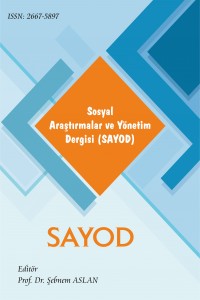Öz
Günümüzde
yönetim anlayışındaki değişmeler ile birlikte olumsuz kavramların yerini olumlu
kavramlar almaya başlamıştır. Son zamanlarda ilgi çeken kavramlardan biri olan
işe angaje olma kavramı Kahn (1990) tarafından bireyin fiziksel,
bilişsel ve duygusal olarak işe sarılmasını ifade etmektedir (Kahn, 1990).
Bu çalışmanın amacı, Türkçe literatürde
son zamanlarda yaygınlık kazanmaya başlayan işe angaje olma kavramını incelemek
ve bu konuda yapılacak diğer çalışmalara ışık tutmaktır.
Çalışmada
işe angaje olma kavramı hakkında detaylı bilgi verilmiş, alt boyutlarına
değinilmiş, bu kavramın ortaya çıkmasına sebep olan tükenmişlik kavramı
ilişkisi ele alınarak kavramın bireysel ve örgütsel olarak sonuçlarına yer verilmiştir.
Literatürde yer alan araştırmalar incelendiğinde, çalışma sonucunda işe angaje
olma kavramının genellikle olumlu sonuçları olmasına rağmen olumsuz
sonuçlarının da söz konusu olduğu görülmektedir
Anahtar Kelimeler
Kaynakça
- Ardıç, K., Polatçı, S. (2009). Tükenmişlik Sendromu ve Madalyonun Öbür Yüzü: İşle Bütünleşme. Erciyes Üniversitesi İktisadi ve İdari Bilimler Fakültesi Dergisi, 32, 21-46.
- Armor D.A., Taylor, S.E., (1998). Situated Optimism: Specific Outcome Expectancies and SelfRegulation. In M.P. Zanna (Ed.), Advances in Experimental Social Psychology, N.Y. Academic Press, 30, 309-379.
- Arslan, E. T., Demir, H. (2017). İşe Angaje Olma ve İş Tatmini Arasındaki İlişki: Hekim ve Hemşireler Üzerine Nicel Bir Araştırma. Yönetim ve Ekonomi: Celal Bayar Üniversitesi İktisadi ve İdari Bilimler Fakültesi Dergisi, 24(2), 371-389.
- Bakker, A.B., Albrecht, S.L. and Leiter, M.P. (2011). Key Questions Regarding Work Engagement. European Journal of Work and Organizational Psychology, 20(1), 4-28.
- Bakker, A.B., Westman, M., and Van Emmerik, I.Y.H., (2009). Advancements in Crossover Theory, Journal of Managerial Psychology, 24, 206-219.
- Bal, E. A. (2009). Bir Pozitif Psikoloji Kavramı Olarak İşe Gönülden Adanma (Work Engagement) ve İnsan Kaynakları Açısından Önemi. Eskişehir Osmangazi Üniversitesi İşletme Bölümü 17. Ulusal Yönetim ve Organizasyon Kongresi, 21-23 Mayıs, 546-552.
- Beckers, D.G.J., Van Der Linden, D., Smulders, P.G.W., Kompier, M.A.J., van Veldhoven, M.J.P.M., and van Yperen, N.W., (2004). Working Overtime Hours: Relations with Fatigue, Work Motivation, and the Quality of Work. Journal of Occupational and Environmental Medicine, 46, 1282-1289.
- Crisp, N., Chen, L. (2014). Global Supply of Health Professionals. The New England Journal of Medicine, 370(10), 950-957.
- Demerouti, E., Bakker, A.B., De Jonge, J., Janssen, P.P.M., and Schaufeli, W.B., (2001). Burnout and Engagement at Work as a Function of Demands and Control, Scandinavian Journal of Work, Environment and Health, 27, 279-286.
- Esen E., (2011). Çalışanların Örgüte Cezbolması, Marmara Üniversitesi, İİBF Dergisi, 3(1), 377-390.
- Hakanen, J., Bakker, A.B., and Schaufeli, W.B., (2006). Burnout and Work Engagement Among Teachers. The Journal of School Psychology, 43, 495-513.
- Hallberg, U.E., Johansson G. and Schaufeli, W. (2007). Type a Behavior and Work Situation: Association with Burnout and Work Engagement. Scandinavian Journal of Psychology, 48, 135-142.
- Kahn, William A., (1990). Psychological Conditions of Personal Engagement and Disengagement at Work. Academy of Management Journal, 33, 4, 693-724
- Kanten, P., Yeşiltaş, M. (2013). Pozitif Örgütsel Davranışlar Üzerine Kavramsal Bir İnceleme. Süleyman Demirel Üniversitesi Vizyoner Dergisi, 4(8), 83-106.
- Köse, A. (2015). İşe Angaje Olma ile Örgütsel Destek Algısı ve Örgüt İklimi Arasındaki İlişki, Zirve Üniversitesi, Sosyal Bilimler Enstitüsü, Dokta tezi, Gaziantep.
- Markos, S., Sridevi M.S. (2010). Employee Engagement: The Key to Improving Performance. International Journal of Business and Management, 5(12), 89-96.
- Maslach, C. ve Leiter, P. M. (1997). The Truth about Burnout. Jossey- Bass, San Francisco: Ca.
- Maslach, C., Leiter, M. P. (2008). Early Predictors of Job Burnout and Engagement.Journal of Applied Psychology, 93(3), 498-512.
- Maslach, C., Schaufeli, W. B., Leiter, M. P. (2001). Jop Burnout. Annual Reviews, 52, 397-422.
- Öner, Z. H. (2008). The Mediating Effect of Organizational Justice : Moderating Roles of Sende of Coherence and Job Complexity on the Relationship Between Servant Leadership And Work Engagement. Marmara Üniversitesi/Sosyal Bilimler Enstitüsü, Doktora Tezi, İstanbul.
- Özer, Ö., Saygılı, M., Uğurluoğlu, Ö. (2015). Sağlık Çalışanlarının İşe Cezbolma Düzeylerinin Belirlenmesine İlişkin Bir Araştırma. Business & Management Studies: An International Journal, 3(3), 261-272.
- Özkalp, E., Meydan, B. (2015). Schaufeli ve Bakker Tarafından Geliştirilmiş Olan İşe Angaje Olma Ölçeğinin Türkçe’de Güvenilirlik ve Geçerliliğinin Analizi. ISGUC The Journal of Industrial Relations and Human Resources, 17(3), 1-19.
- Ravikumar, T. (2013). A Study on Impact of Team Work, Work Culture, Leadershıp and Compensatıon on Engagement Level of Employees in Msmes in Indıa. International Journal of Advanced Research in Management and Social Sciences, 2(8), 175-185.
- Robbins, S. P., Judge, T.A. (2012). Tutumlar ve İş Tatmini, Örgütsel Davranış (s. 71-97), İnci Erdem (Ed.), 14. Baskı, İstanbul: Nobel Yayınları.
- Roozeboom, M.B. ve Schelvis, R. (2015). Work engagement: drivers and effects, http://oshwiki.eu/wiki/Work_engagement:_drivers_and_effects.
- Scahufeli, W.B., Taris, T.W. Le Blanc, P., Peeters, M., Bakker, A.B. and de Jonge, J., (2001). Does Work Make Happy? In Search of the Engaged Worker. De Psycholoog, 36, 422-428.
- Schaufeli, W. B. (2012). Work Engagement what do we know and where do we go? . Romanian Journal of Applied Psychology , 14(1), 3-10.
- Schaufeli, W. B. (2015). Engaging Leadership in the Job Demands-Resources Model. Career Development International, 20(5), 446-463.
- Schaufeli, W. B., Salanova, M., Gonzalez, V. ve Bakker, A.B. (2002). The measurement of engagement and burnout: a two sample confirmatory factor analytic approach, Journal of Happiness Studies, 3, 71-79.
- Vancouver, I.B., Thompson, C.M., Tischner, E.C. and Putka, D. J., (2002). Two Studies Examining the Negative Effect of Self-Efficacy on Performance, Journal of Applied Psychology, 87, 506-516.
- Wildermuth, M. (2008). 10 MS of employee engagement. Training and Development, 50-53.
Ayrıntılar
| Birincil Dil | Türkçe |
|---|---|
| Konular | İşletme |
| Bölüm | Makaleler |
| Yazarlar | |
| Yayımlanma Tarihi | 1 Nisan 2019 |
| Yayımlandığı Sayı | Yıl 2019 Yıl: 2019, Sayı: 1 |

